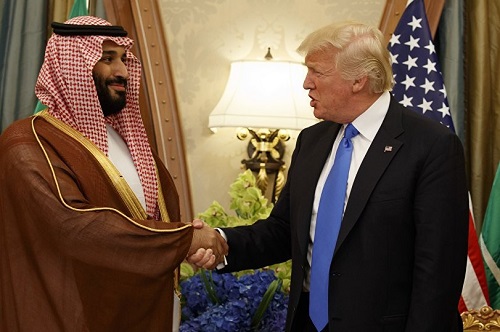AP photo
By
Tom Arms
The extremely likely interrogation, torture and murder of Washington Post journalist Jamal Khashoggi inside the Saudi Arabian consulate in Istanbul is set to have far-reaching consequences.
The position of Iran, the civil war in Yemen, the Arab-Israeli conflict, reform in Saudi Arabia, the tenure of Crown Prince Mohammad bin Salman, the economic development of Saudi Arabia, US foreign policy and the credibility of President Trump will all be affected.
I should add the caveat that as of this writing there is no body and the Saudis continue to deny, deny, deny. But so far they have failed to explain why Mr Khashoggi went into the consulate to keep a 1.15pm appointment on the second of October and has never been seen since. Neither have they offered an explanation as to why he was preceded and followed by Saudi agents, some of whom carried what are believed to be bone cutting tools. Finally, the Saudi officials have failed to explain an audio recording which strongly indicates the interrogation and torture of Mr Khashoggi.
The onus is on the autocratic ruler of Saudi Arabia— Mohammad bin Salman (aka MBS) to either produce a live Jamal Khashoggi or a credible explanation for his disappearance. So far he has only shrugged his shoulders, arched his eyebrows and replied: “I dunno. Nothing to do with me.”
The immediate casualty of the Khashoggi Affair has been MBS’s showcase economic summit the Future Investment Initiative due to start in Riyadh on the 23rd of October. The meeting was organised to attract foreign investment to kick start the Crown Prince’s ambitious Vision 2030 economic plan. This is designed to transform Saudi Arabia from an oil-dependent theocratic kingdom into a socially, politically and economically diverse modern state. Dozens of key players are protesting against Mr Khashoggi’s disappearance by refusing to attend. MBS’ super showcase is threatening to turn into a damp squib.
The Saudis need the money, and not just to diversify their economy. They need to pay for the $110 billion US arms deals that Trump announced at the start of his administration. They need the weapons to continue to fight their controversial war in Yemen and stand as a regional bulwark against an increasingly aggressive Iran.
From the West’s point of view, Saudi oil is less important than ten years ago. American success in tapping new resources with fracking techniques has completely altered the global energy picture. In June US oil production hit a record high of 2.2 million barrels a day and America has returned to the glory days of being a net energy exporter. If, as threatened by Saudi officials, the desert kingdom imposes an oil boycott in response to possible Congressional sanctions over the Khashoggi Affair, it can only push up world oil prices and help the US oil industry.
Politics, however, are another matter. The Trump Administration has put too many eggs in the basket marked “personal relationship with Mohammad bin Salman”. The President invested substantial political capital in the Crown Prince by making his first foreign trip to Riyadh. His son-in-law Jared Kushner flies in and out of the Saudi capital. MBS is said to be his new best friend and a keystone in Kushner’s yet to be unveiled and much trailed Arab-Israeli peace plan. On top of that, MBS is the driving force behind the anti-Iranian US-Saudi alliance.
By developing a foreign policy based almost entirely on personal chemistry with MBS the Trump Administration has backed itself into the Crown Prince’s corner. MBS is being blamed for the disappearance of Khashoggi. He was blamed for the detention of Lebanese Prime Minister Saad Hariri and hundreds of dissenting members of the Saudi royal family. The Crown Prince could fall from power over the Khashoggi affair and would most likely be replaced by religious hardliners. If he does, America’s Middle East strategy and the credibility of Donald Trump will be dealt a severe blow.
Tom Arms
I am a journalist, entrepreneur and historian with extensive experience in print, web and broadcast journalism. I started as a diplomatic correspondent, wrote several books (The Falklands Crisis, World Elections On File and the Encyclopedia of the Cold War), and then in 1987 started my own business (Future Events News Service, www.fensinformation.com) which over 25 years established itself as the world and UK media’s diary. Our strapline was: “We set the world’s news agenda.” I sold FENS in December 2012 but retained the exclusive broadcast rights to all of FENS data. To exploit these rights I set up LookAhead TV which produces unique programmes which “Broadcasts Tomorrow Today” so that viewers can “Plan to Participate.” LookAhead has appeared regularly on Vox Africa, Radio Tatras International, The Conversation and Voice of Africa Radio.
In addition to being a syndicated broadcaster and columnist on global affairs, Tom is also available for speaking engagements and can be contacted on Twitter, Linkedin and email: [email protected].



Tks for commenting on this issue of the highest importance.